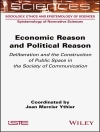Auguste Comte's doctrine of positivism was both a philosophy of science and a political philosophy designed to organize a new, secular, stable society based on positive or scientific, ideas, rather than the theological dogmas and metaphysical speculations associated with the ancien regime. This volume offers the most comprehensive English-language overview of Auguste Comte's philosophy, the relation of his work to the sciences of his day, and the extensive, continuing impact of his thinking on philosophy and especially secular political movements in Europe, Latin America, and Asia. Contributors consider Comte’s reasons for establishing a Religion of Humanity as well as his views on domestic life and the arts in his positivist utopia. The volume further details Comte's attempt to apply his "positive method, " first to social science and then to politics and morality, thereby defending the continuity of his career while also critically examining the limits of his approach.
Om författaren
<b>Michel Bourdeau (Editor) </b><br> <b>Michel Bourdeau</b> is Emeritus Senior Researcher at the Institut d'histoire et de philosophie des sciences et des techniques in Paris. He is the secretary of the Association internationale La Maison d'Auguste Comte and the author or coeditor of several books and numerous articles on Auguste Comte.<br><br><b>Mary Pickering (Editor) </b><br> <b>Mary Pickering</b> is professor of history at San Jose State University. She is the author of the three-volume <i>Auguste Comte: An Intellectual Biography.</i><br><br><b>Warren Schmaus (Editor) </b><br> <b>Warren Schmaus </b>is professor of philosophy at Illinois Institute of Technology. He is the author of <i>Rethinking Durkheim and His Tradition </i>and <i>Durkheim's Philosophy of Science and the Sociology of Knowledge: Creating an Intellectual Niche</i>, and is coeditor of <i>Love, Order, & Progress: The Science, Philosophy, & Politics of Auguste Comte</i>.<br><br>












